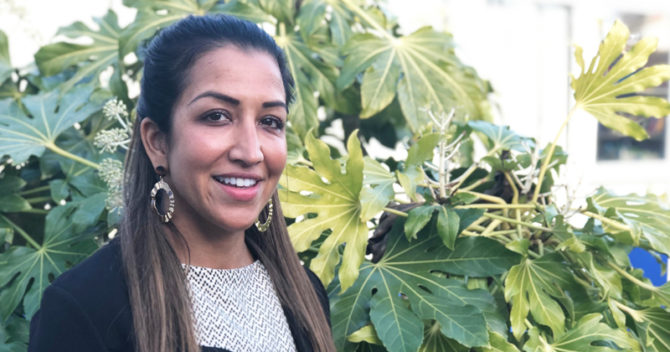Navdeep Sanghara is the only interviewee ever to have interpreted my question about what makes a great gift as something other than a birthday present.
“A book” – the most common response – would have been an easy choice for Sanghara, who waxes lyrical about how her five-school southeast London primary trust has designed a “global curriculum” around quality children’s literature. We’ve just toured Rockliffe Manor, chatting to children about books such as The Other Side of Truth by Beverley Naidoo, which raises themes of refugees and press freedom.
Instead she chooses learning, pointing out that ‘Sikh’ – her religious identity – means learner. “My grandma wasn’t educated, but she taught me a lot through her stories and interactions and experiences.
“She couldn’t speak English, but she learned that when the milkman came, if she wrote “ss” he’d leave sausages and if she wrote “gs” he’d leave eggs. She learned these little tricks.
“Education for my family was always the big thing. That was why they moved from India to Africa; my grandparents felt that my parents would get a better education at the British schools in Kenya, which they did. Then my parents moved here, probably for that same reason.
“For me it’s come almost full circle, because while I do feel that education is important, learning is a gift. It doesn’t have to be academic. It can be through connections, storytelling, knowledge, reading. But you pass that gift on through the next generation.”
Sanghara’s family has come up repeatedly in our conversation – when I ask about her role models for becoming a school leader, she talks about her mum, a receptionist.
I will just be me; take me or leave me
“She was a strong role model in terms of the love and believing in you, whatever. So her kindness has come in when I’m leading people – I try to connect with them as humans first.”
I’m surprised, because the chief executive of her MAT, Rob Carpenter, has recently written a good book on leadership and I’d expected her to talk about him.
She’d been teaching for six years when she was promoted to head of school at Rockliffe Manor. Carpenter had been brought in as executive head after the school had been rated good in two successive Ofsted inspections, but its leadership grade had stagnated at satisfactory. So what was it that Carpenter saw in her? “She had ways of navigating difficult conversations” with colleagues, he says. “She’s also very skilled at assessing what teachers need to do to improve. She’s a natural coach.”
He also praises her “ability to lead through relationships”.
Sanghara says Carpenter was the first person she felt professionally aligned with in terms of “vision and values and serving the community”.
But they are very different, and emulating his leadership style didn’t work for her. “By that point he was on his journey where he’d found his authentic self. But it wasn’t…my style.”
Now that she’s worked it out Sanghara talks a lot about authentic leadership when she mentors emerging leaders. “As I’ve developed I’ve realised, that’s what people connect with – who you are. So give a bit more of yourself. Show who you are as a person.
“My kind of authentic self is the fact that I’ve grown up in southeast London. I love going out in Peckham and listening to grime music. But the next day, I can lead an Inset day in front of 300 people, and that’s a good thing. That duality is a good thing. You don’t have to fit into one box of what you need to be like.”
Part of managing that duality is knowing how to act the part, admits the 37-year-old, who would have loved to act professionally. “You have to exude confidence and certainty, because it makes people feel psychologically safe. And if you’re that figurehead of a community, people want to feel… OK, she knows what she’s doing. Let’s follow.”
She recalls an incident at the University of Portsmouth where she studied psychology. She was clubbing with fellow students who didn’t want to stay in the R&B room because there weren’t any other white people, which made them uncomfortable. “I was so cross, I didn’t know how to say it, ‘So how do you think I feel every day of my life?’”
She does less bending and flexing to accommodate others these days. “I don’t have to navigate myself through every social situation to make other people feel more comfortable. I will just be me, and then you can take me or leave me. It’s fine, but it’s been a journey.”

After graduating, Sanghara returned to her home community of Woolwich, where she had lots of friends and family, and she’s been there since.
“I feel like that has made me even more passionate about what I do. Because you’re serving the community that gave you that opportunity. Through education, I’ve been given choices. That’s what I want for our children.”
In Born to Fail? the academic Sonia Blandford argues that the idea of social mobility as educating bright working-class individuals to abandon their home communities for a middle-class existence is problematic.
Sanghara hasn’t heard of the book but she takes a note of it. “There’s nothing wrong with the fact that I was pupil premium or that my parents were immigrants… all of that has made me who I am. Let’s stop the labels and the boxes and actually think about… not social mobility, but social equity. And let’s give people options, but not play down or be dismissive or judgmental about where their starting point has been.”

Education has to be about “nurturing children’s interests and strengths, and giving them skills that will make them more rounded citizens. Maybe for some of them it will be cutting the grass on Gilbourne estate [the social housing estate next to Rockcliffe], and there’s nothing wrong with that. That isn’t lacking aspiration, because for some children that will be them pushing their limits. It’s not for us to judge, or put on the children that if you’re not a teacher, doctor or lawyer you haven’t made it. That is really key.”
Her father worked as a carpenter, despite having top A-level grades. He moved from Kenya on his own at 16. “He was going to college in the day, working 12 hours in a bakery at night to get money to be able to live – just that level of tenacity and drive – and then he didn’t even end up going to university, even though he got three As: pure maths, applied maths, physics.” This was because he was classified as an international student and couldn’t afford the tuition fees. “So he worked on a building site as a carpenter. Just before he died, he oversaw the building of the athletes’ village for the 2012 Olympics, so he ended up being a project manager.”
“Work hard, be kind, and stay humble,” was always her dad’s advice.
Developing character is a guiding principle of her trust’s curriculum and the books they choose for the termly topics reflect this. “We’ve got a curriculum map and you might have a global theme, a core text that’s linked to it, and then the characteristics that we want to develop in the children.”
Making sure her pupils can connect emotionally with what they’re studying is important to Sanghara. One term they chose The Boy in the Tower by Polly Ho-Yen because one of the trust’s schools was affected by an urban regeneration project. “It was about the community kind of disintegrating because they were pulling down all the tower blocks, but alongside it, it had themes of mental health.”
Let’s think about not social mobility, but social equity
Just as important, however, is the strength of the writing. “We’ve tried to keep the core text strong in terms of the conventions of writing that it’s modelling. You don’t want to just pick something because it fits a theme.”
Sanghara sees her duty as a school leader as developing global citizens. “We’re doing our part now, because I feel like if our children go off into secondary school, actually what we’ve given them here is a good starting point in terms of empathy and their own identity and their connection to the wider world and gender equality.”
It’s a personal thing
What’s your favourite book?
A Fine Balance by Rohinton Mistry. I read it when I was on holiday in my twenties and remember not wanting it to end. I was literally saving each paragraph because I was so emotionally invested in the characters. It’s about India and Partition. It was the tiny stories and interactions that were really powerful.
Which teacher most influenced you?
My English teacher at secondary school, Mr Hayes. He was such a character. In our first lesson he didn’t talk. Then after about 20 minutes he suddenly ran to the window and said, “It’s a beautiful day!” and we all burst out laughing. I remember that feeling – he did it to create anticipation.
He was great at pushing me to do more than I thought I could. When I left school, in the leaving book, he wrote “Dear Navdeep, don’t ever lose that fire in your belly.” I remember thinking, what’s he talking about? I didn’t see it in myself. Now as an educator, I understand. He probably saw it for lots of children, but it made it feel like it was only me.
If you could escape anywhere for a month, where would you go?
India. My parents were born in Kenya, and they have never been. My mum is 60, there’s a [Sikh] pilgrimage this year and I’m trying to encourage her to go, saying she can do a prayer for my dad and take some of his things there.
I went once, but I was much younger. I’d like to go back and maybe do some sort of retreat and take it in more, digest it. I think it helps you to know where your journey began.
What slogan would you put on a billboard?
There’s one that I like for leadership: “A leader is best when people barely know she exists and when her work is done, they will say ‘we did it ourselves’.”
Then there’s one I always come back to when times are tough and I need some inner strength: “No matter how you feel, get up, dress up, show up and never give up.”
CV
2018 Headteachers Roundtable member
2016 Awarded national leader of education
2016-present Executive headteacher, Inspire Partnership
2015-16 Executive headteacher, Rockliffe Manor and Woodhill primary schools
2013-15 Headteacher Rockliffe Manor
2012 NPQH, Institute of Education, UCL
2011-12 Head of school, Rockliffe Manor
2011 Deputy head, Rockliffe Manor
2007-11 Class teacher, subject leader, phase leader, Rockliffe Manor
2005-07 NQT Mulgrave primary school
2004 PGCE, Goldsmiths, University of London
2003 Teaching assistant, Deptford Park primary school
1999-2002 Psychology BSc, University of Portsmouth














Your thoughts